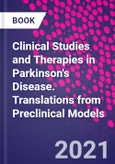More than 50 years have passed since the use of L-dopa in the palliative treatment of Parkinson's disease, but it remains the most common treatment despite inducing severe side effects such as dyskinesia after 4-6 years of use. Numerous preclinical investigations based on endogenous neurotoxin models have promised various therapies for Parkinson's disease, but these efforts have failed?when attempting to transfer these successful results to preclinical studies. Although several publications have warned of these failures, the scientific community remains mostly unaware, and there is a need to focus their efforts on potential therapeutics that can slow or halt development of the disease.
Clinical Studies and Therapies in Parkinson's Disease: Translations from Preclinical Models analyzes preclinical models based on exogenous neurotoxins and why they have failed. Neuroscientists, neurologists, and neuropharmacologists will benefit greatly from the book's discussion of these newer models, their benefits, and the need for their implementation. This book also provides the basic concepts of dopamine metabolism for students taking courses in neurochemistry, neuroscience, neuropharmacology, biochemistry, and medicine.
Please Note: This is an On Demand product, delivery may take up to 11 working days after payment has been received.
Table of Contents
1. Parkinson's disease2. Parkinson�s pharmacological therapy
3. Dopamine synthesis
4. Dopamine storage and release
5. Dopamine oxidative deamination
6. Dopamine methylation
7. Dopamine oxidation to neuromelanin and neurotoxic metabolites
8. Neuroprotective mechanisms against dopamine oxidation-dependent neurotoxicity
9. Preclinical model based on exogenous neurotoxins for Parkinson's disease
10. Preclinical models based on genetic mutations associated with the familial form of Parkinson�s disease
11. Preclinical models based on endogenous neurotoxins
12. Conclusions








